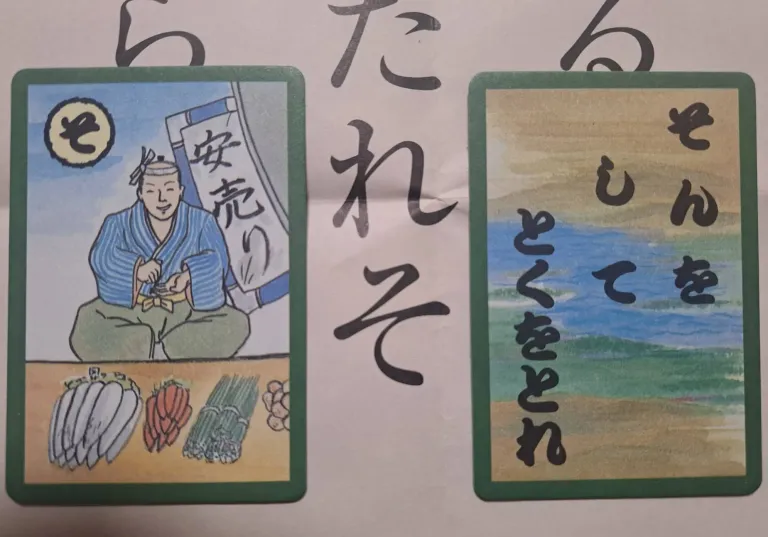
No, I'm not playing the TRUMPeter for this post, if only because the meaning of the Japanese proverb I'm looking at tonight is that it's the big guy who takes the hit to foster good relations; he's not the one dishing out the "short term pain" but receiving it.
It's been three months since I last blogged about the Japanese "karuta" deck of proverbs, here:
https://hive.blog/hive-147010/@hirohurl/iroha-karuta-17-b-the-bud-may-have-a-bitter-taste
Tonight I'm looking at the 18th card in the "Iroha" series. "Iroha" refers to the old syllabary in which the 18th syllable is 「そ」 - "so" - which you can see in the top left corner of the picture card.
The illustration depicts a cheerful looking greengrocer with his vegetable wares in front of him on the deck. He appears to be passing a few coins from his closed right hand to the open palm of his left hand as if he's just sold some veg to somebody rather cheaply, as the banner behind him suggests. The banner says,
安売り (yasu-uri),
meaning "cheap-sale" or "discount."
Turning to the proverb itself, which begins with the "so" syllable, it is written all in hiragana script and says,
そんをしてとくをとれ = Son o shite toku o tore
Okay, let's break it down:
Son = loss
o = object marker
shite = do
toku = gain
o = object marker
tore = take
So a direct translation might go something like this:
(I) do a loss a gain to take = (I) accept a loss (now) to make a profit (later)
The nuance of "son o shite" is quite interesting because the standard way to say "make a loss" (which is unintentional) is to say,
son o shita (past tense) = (I) made a loss.
However, by saying,
son o shite... = making a loss...
we understand that that is not the end of the matter and may be freighted with a feeling of intention:
"By accepting a loss now, I will gain a profit later."
Profit and Gain: 利益」 (rieki) and 「得」 (toku)
Wait a minute though, the word in the kotowaza is not exactly "profit" - 「利益」 (rieki) - but "gain" - 「得」 (toku).
Whereas "rieki" (profit) usually refers to business and financial gain, "toku" (gain) carries a more general or abstract sense of benefit, or advantage, including personal or moral benefit; it does not exclude monetary gain, but has a wider field of reference, perfect for the suggestive power of proverbial Japanese.
The Explanatory Booklet: 「説明書」 (setsumeisho)
Even so, the 説明書 "setsumeisho" (explanatory booklet) glosses the proverb in terms of "profit":
損をして得をとれ
大きな利益を得ようとすれば、小さな損をして下地を作ることが大切である。目先の利益だけを追うと、大きな利益を得ることはできない。
Ookina rieki o eyou to sureba, chiisana son o shite shitaji o tsukuru koto ga taisetsu de aru. Mesaki no rieki dake o ou to ooki na rieki o eru koto wa dekinai.
"If you want to gain a big profit, it’s important to take a small loss in order to lay the groundwork. If you only chase short-term profit, you won’t be able to gain a larger profit."
My Final Translation
Okay, with all that in mind, here we go with my considered translation!
Son o shite toku o tore.
Give a little, gain a lot.
I couldn't match the syllable count, or the reproduce the exact sound pattern, but whereas the Japanese pattern goes S O S, T O T, my version goes G A L, G A L. I like the suggestion of intention behind "give a little" on the loss side of the balance sheet, and I'm also pleased to tack closer to the literal meaning by translating "toku" (noun) as "gain" (verb).
Okay, now I'm going to put ChatGPT and Google to the test. So far, ChatGPT has taken the biscuit...
ChatGPT
Take a loss to make a gain.
Very good and proverbial, nicely balanced.
Google Translate
Take a loss to gain.
Well, it certainly has the virtue of brevity but doesn't it sounds a bit awkward and unbalanced. It is not exactly incomplete, but seems so.
ChatGPT wins again!
18th Daiso Karuta Kotowaza
Once again, my cheerful dime store deck has offered a different proverb to illustrate 「そ」 - "so", so I shall save it for the next blog post in this Iroha Karuta series.
Cheers!
David Hurley
#InspiredFocus
For the best experience view this post on Liketu